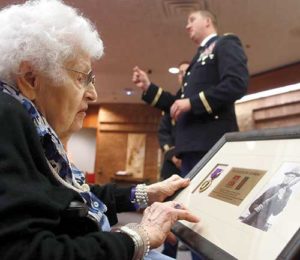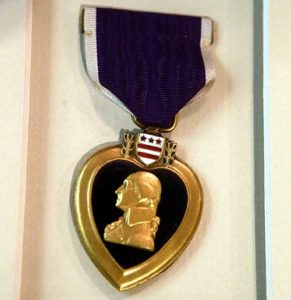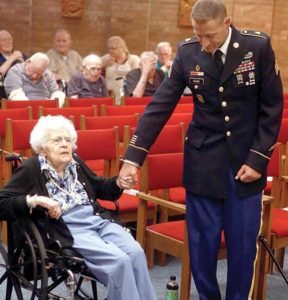GREENFIELD — His adult grandchildren remember Boleslaw (Bill) Adamski as a man who played sheepshead with friends at Milwaukee’s Mitchell Park, near his home in the neighborhood of South 28th and West Scott streets, as well as canasta with relatives.

Florence Adamski Gaszak examines the framed Purple Heart, which also includes a photo of her father, Boleslaw (Bill) Adamski, who was awarded the medal for his service in World War I. (Catholic Herald photo by Allen Fredrickson)
They further recall a fellow whose “multiple” occupations through the years included that of butcher, whose fondness for cigars and pipes didn’t impede his living for nearly a full century and whose recreational walking pastime was invariably pursued in dress shoes.
“Very outgoing,” summarized grandson Jeff Depka of New Berlin. “He liked his beer and a shot,” granddaughter Denise Radliff of Waukesha said with a chuckle. Depka added that the adjective “patriotic” could legitimately be applied to the Polish-born World War I soldier who died in 1989 and is buried at St. Adalbert Catholic Cemetery in Milwaukee.
According to his grandson, Adamski, a cousin of the late Fr. Max Adamski, founding pastor of Milwaukee’s St. Roman Parish, “never spoke about the war.” Imagine, then, how surprising it was for his descendants to learn that Adamski had been awarded a Purple Heart in connection with his military service and that, furthermore, his medal of distinction had been lost and then located on eBay – and would consequently be returned to the World War I vet’s family.
“Return” is actually a technical term employed by the non-profit, Vermont-based Purple Hearts Reunited Foundation, and the Adamski medal return took place Aug. 26 at Villa Clement, an assisted living facility in Greenfield where the eldest of Adamski’s three children, 92-year-old Florence Adamski Gaszak, resides.

A close-up of the Purple Heart awarded to Private Boleslaw Adamski during his service in World War I. It was located on eBay before being returned to Adamski’s family in August. (Catholic Herald photo by Allen Fredrickson)
Bill’s son, Edward, was a seminarian when he drowned many years ago and Bill’s wife, Mary, also preceded him in death. Elderly daughter Alice, mother of Depka and Radliff, was unable to make it to the ceremony honoring her father in the Villa Clement chapel. However, some 50 individuals were on hand —relatives of Adamski, plus Villa Clement employees and residents, some of them military veterans.
The 45-minute ceremony started with the Pledge of Allegiance, and a prayer offered by Fr. John Baumgartner, a senior priest of the archdiocese and Villa Clement resident. There were also remarks by Depka; by Jason Church from U.S. Senator Ron Johnson’s office; and by Purple Hearts Reunited founder and CEO Zachariah Fike, a captain in the Vermont Army National Guard.
“I know how important this award is,” said Church, himself a Purple Heart honoree after losing his legs in Afghanistan. “It’s for those who gave their blood or their lives,” added Fike, who pointed out that the Purple Heart – originally called the Badge of Military Merit – is the oldest of American military awards and an honor first conferred by George Washington.
Adamski “lived a long and fruitful life,” Fike reminded the gathering. “We’re here to celebrate his life (and) to immortalize his service.” By doing so, he said, participants in a sense were “bringing this man back to life again.”[su_pullquote align=”right”]For more information, visit www.purpleheartsreunited.org.[/su_pullquote]
Details of the incident that led to Adamski’s Purple Heart have been lost; as family members pointed out, the honoree was not one to discuss the subject. The great likelihood, Purple Hearts Reunited personnel suggested, is that the Polish-American soldier was injured by enemy bullets or shrapnel.
It is known that Adamski went into the military at age 25 in 1917, four years after immigrating to the United States from Poland. A private in the army, Adamski was affiliated with an “Engineers” outfit in the hitherto unparalleled conflict known variously as “the Great War” and the “war to end all wars.” He was mustered out of the military at Camp Shelby in Mississippi in the summer of 1919, became a naturalized citizen three years later and died May 10, 1989 – at age 98.

Gregg Haak, a member of the Valor Guard, joins hands with Florence Adamski Gaszak during the opening prayer at a ceremony to return a Purple Heart awarded to her father, Private Boleslaw Adamski, during his service in World War I. The ceremony took place at Clement Manor, Greenfield, Aug. 26. (Catholic Herald photo by Allen Fredrickson)
“I’m gonna hang this around my neck,” Florence Gaszak, sitting in a wheelchair, said to laughter when presented with a photograph of her father framed alongside his recovered Purple Heart – one of 1.8 million such medals issued.
“The fact that a (World War I veteran’s) daughter is still with us completely knocked me off my feet,” commented Fike, who typically returns medals awarded in the early years of the previous century to more distant descendants.
The slogan of Fike’s organization is “Earned Through Valor, Lost by Circumstance, Reunited with Dignity.” A recent Purple Hearts Reunited press release indicates the organization “has returned medals and artifacts to over 200 families and museums.”
Purple Hearts go up for sale on a daily basis, Fike told the assembly at Villa Clement. Some have been stolen, others found buried in the earth, still others discovered in abandoned houses. Last year, according to the organization’s CEO, Purple Hearts Reunited spent $50,000 in order “to rescue” medals.
